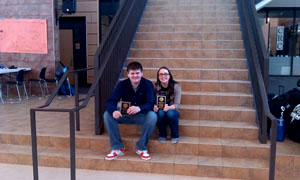Debate team argues their way to the top

Junior Trace Thompson and senior Lillie Ouellette-Howitz display their plaques after winning the Minnesota State Debate Tournament.
March 11, 2014
“Everyone knows what a debate is. You see debates every day,” reads the Minnesota Urban Debate League (UDL) Manual. “You have debates too, whether you know it or not. You and your friends might debate about a favorite athlete, or which rapper is better, whose fashion sense is the best, or whose momma is fattest.”
While the debaters on South’s team no doubt participate in these day-to-day arguments, the rules, competition, and strategies take them to the next level.
“It’s a really intense experience,” said senior debater Lillie Ouellete-Howitz, talking about a typical debate tournament. “You’re pretty much gone from after school Friday until like, 10pm, then the tournament starts again at 7am in the morning, and you go again until like 10pm on Saturday.”
Debate tournaments take a long time, not to mention a lot of energy to keep arguing all day, and about the same topic. For the entire year, everyone in the UDL has to argue about the same topic. “This year the topic is about economic involvement in Latin America,” explained sophomore Dana Saari. “So this year we have to argue about that.”
“Tournaments can be really fun, but mostly during down time between rounds,” explained senior AJ Gerick. “I can generally relax between rounds, but as soon as pairings are out, I get very stressed again. I would say that during rounds, I’m still stressed, but more focused on the round than my stress.”
A debate round is won by convincing the judge to vote for their idea. Debate rounds have several bouts back and forth between teams, each promoting their idea, and play down the opposition’s.
“Judges judge the debate and decide on who won based on, usually, technical proficiency,” junior Trace Thompson clarified. Technical proficiency means the knowledge you have about the subject matter, and how well you explain that information. Of course, there is always the option of pleading to the judge not to vote for the other side, because they have the disadvantage in the debate. In this case, the opposition’s side would have had the easier time with researching their side of the argument.
“You have to be prepared to go more in depth than a single argument,” said Saari.
A good debater needs focus, and a lot of it. Many start young and continue on through college, taking advantage of scholarship opportunities.
“I did it in middle school,” Saari stated. “I tried going to practice once for the South debate team, and everyone was really nice and then I was like, ‘Hey I don’t really care, I’ll just join.”
“I guess I’d like everyone to know that the South debate team is a really great group of people,” said Gerick. “It’s not only a great thing to put on college applications, its a really fun activity, and really informative.”




